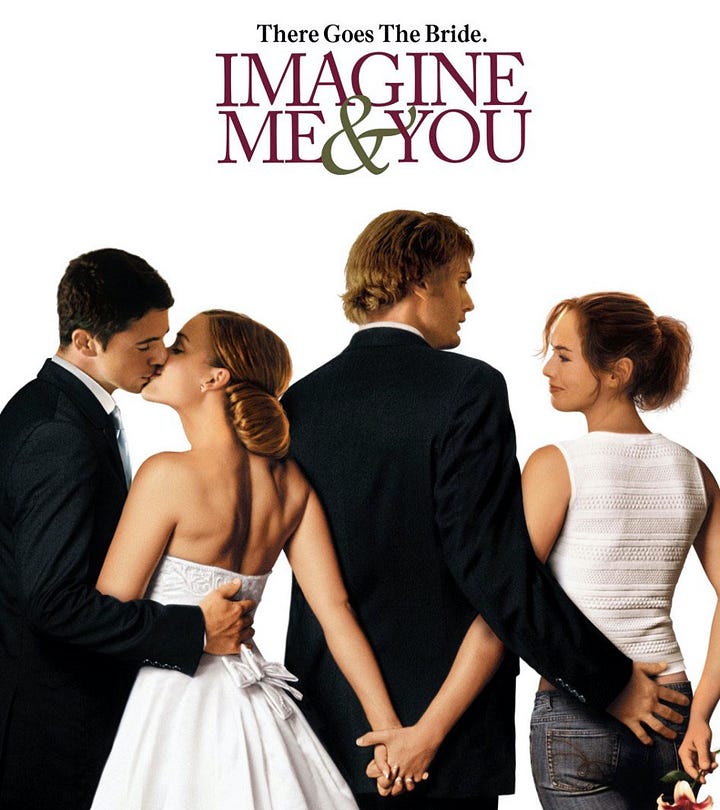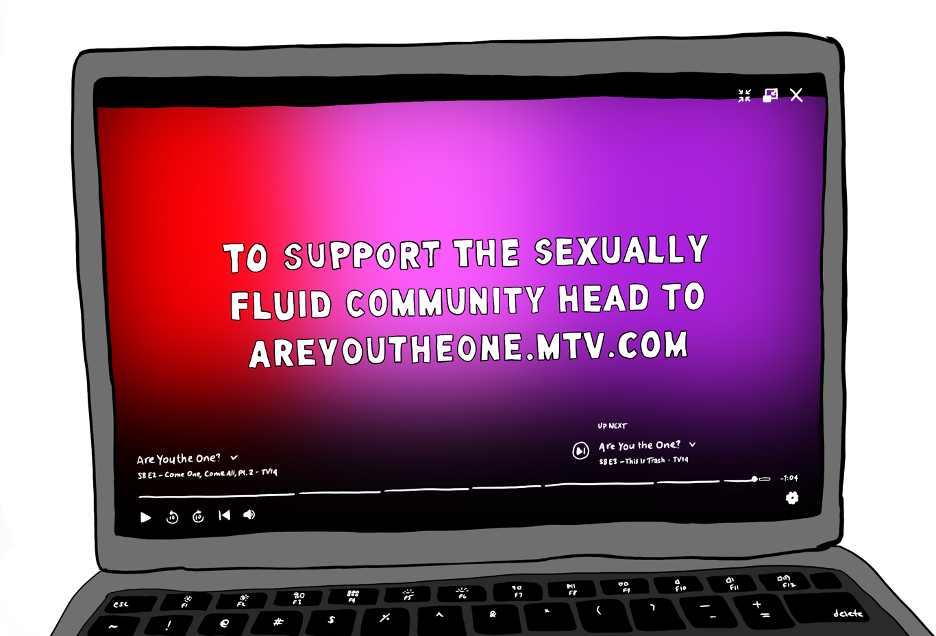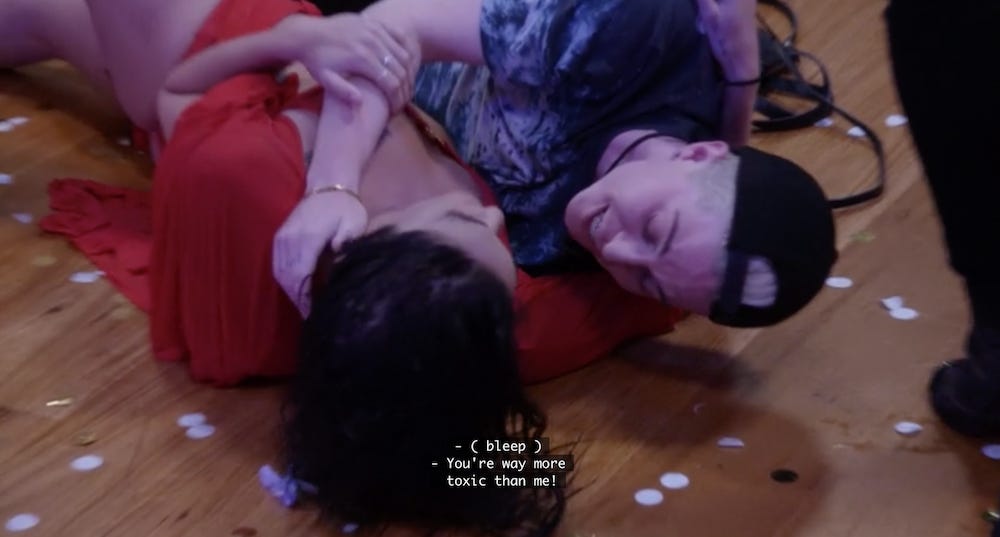Review: Support the Sexually Fluid Community
‘Are You the One’ Season 8 is Masterful Queer Documentary Filmmaking
Hi, it’s Michelle Visage! Do you want gay shit? Remember that after this review is our segment, ‘The Elephant in the Werkroom’. Read on for my thoughts on this week’s episode of RuPaul’s Drag Race Season 15!
The Yearning Rating: ✰✰✰½
Romance ✰½
Sex ✰✰½
Storytelling ✰✰
Performance ✰✰✰✰✰
Yearning ✰✰✰✰✰
Written by Ali Romig
In 2007, MTV premiered a dating show that it hailed as “the ultimate battle of the sexes.” It was a Bachelor/ette style show with a “bisexual twist”. I am, of course, talking about A Shot at Love with Tila Tequila. The show began with Tila—I don’t claim to know where her fame stemmed from other than being a personality—meeting 16 straight men and 16 lesbian women who would go on to fight for her love and attention over 10 episodes. And while the audience had been informed of the show’s premise, prior to the end of the first episode—titled “Surprise! I Like Boys and Girls”—the contestants had not. “This show’s the perfect experience because it’s really gonna help me figure out Do I really like a guy? or Do I really like a girl?” Tila wonders aloud in the intro sequence. The show never offered a more nuanced take on sexuality than this. The entire concept of bisexuality was quite literally being reduced to its perceived “shock-value.” It portrayed Tila as a bemused plaything—unsure of where her “real” desire lies. Later, in between sharing Nazi-influenced social media posts, Tila would admit that she was never actually gay or bisexual. Gasp!
In the years since Tila Tequila went gay for pay, other reality dating shows have had to confront the rather inconvenient fact that people like us—read: queer people—exist. Some have responded by dismissing the possibility of queer narratives outright (Love Island, I’m looking at you). Others have half-heartedly tried to incorporate these narratives—with mostly disappointing results. While franchises like The Bachelor have notable queers in their metaverses, most of those people came out after their time on the show. (I maintain that the song “For the Girls” by Hayley Kiyoko is sonically rotten, but still Hayley + Becca ❤️). Of course, exceptions exist. In 2017, The Bachelor featured bisexual contestant Jaimi King; however, her time on the show was brief and her storyline mostly centered around what it meant to be bisexual. Then in 2019, Bachelor in Paradise made franchise history with Demi, who found herself torn between the man she was falling for on the show and the woman she had been dating at home. But in both of these instances, these women were notable mostly for throwing an interesting wrench into the show’s tried and true formula. Their queerness was the source of the drama. They were aberrations—exclusively there to scandalize or educate rather than “succeed” in the game of reality dating.
Elsewhere in 2019, while Bachelor in Paradise was still tasking their lone bisexual contestant with educating the straight masses about the basics of human sexuality, another show decided to finally go where no other reality TV dared go before. MTV—yes, that very same network that forced Tila Tequila down our throats so many years earlier—aired its eighth season of Are You the One? Since dubbed, “The Queer Season”. Rather than cast just one or two queer contestants, Are You the One? Season 8 is made up entirely of queer—or sexually fluid—contestants. The result is a brilliant, beautiful mess.
If you’re like me—and almost every other queer person I know—you likely binged Season 8 of Are You the One? in the depths of the pandemic. But if not, the season was recently made available on Hulu (hence my eagerness to resurrect it as a topic of water cooler conversation). For the sake of full transparency, I have never seen a single other season of Are You the One? and have no plans to change that1. The premise of the dating show is simple, unimportant even. In most seasons, the producers throw an equal number of cis, straight men and women into a generic, string-light-adorned vacation home and task them with finding their “perfect match” (chosen for them using science2). Then they roll the cameras as all hell breaks loose. If the contestants accurately identify all of the “perfect matches” they have the chance to win $1M (split amongst them so…more like $50K per person…decidedly not as exciting). But in Season 8, the show enlisted sixteen contestants who all fell somewhere on the pansexual spectrum—meaning there was equal opportunity for anyone in the house to be someone else’s “perfect match”.
When I first heard about the show, I was skeptical. I mean, the season’s tagline was, “Come one, come all.” How could I be sure that this wasn’t going to be another reality show that positioned bisexuality, or queerness in general, as the butt of some dirty joke? I was still haunted by Tila’s breathy, insincere lilt—Do I really like boys or girls? Still, I decided to watch (it was the pandemic, I was desperate). And what I witnessed in those 12 episodes was far more genuine—and far more joyful—than what I expected. For once, I was watching a reality dating show where the contestants’ sexuality wasn’t being exploited for drama! Instead, the producers were exploiting the contestants in other ways for drama. How refreshing!
In all seriousness, the tone of the show surprised me right from the get-go. Yes, there is some “explaining” of sexuality that happens in the first minutes of the premiere—but once the third or fourth contestant in a row says that they are open to anyone, any shock-value the producers may have been hoping for wears off and the idea of sexual openness as the norm becomes ingrained into the fabric of the show. Where other shows might have bisexual, pansexual, or queer contestants lamenting the “inconvenience” of their identity, or nervously preparing to “come out” to the object of their affection, Are You the One? Season 8 features confessional after confessional of contestants celebrating their identities. “I’m bisexual and I fucking love it,” exclaims Kari, the first woman to walk through the doors of the house. A few minutes later, Justin (a man who can only be described as a beefcake) calls bisexuality his “superpower.” One of the pillars of the show is choosing contestants who historically suck at dating; but even when discussing their past relationship failures, no one suggests their sexuality is to blame for their romantic woes. Max, one of the more newly-out contestants, says that he believes his past heartbreaks stemmed from being uncomfortable with his sexuality, rather than his sexuality itself.
Gender expansiveness is also celebrated on the show. Basit, a transfeminine, nonbinary contestant lets the audience know right away that they’re exhausted by the cisheteronormative world. “All my life I’ve had to dumb down who I am,” Basit shares—a statement that, in my opinion, cuts right to the heart of what being queer means. We’re not being “too much,” “complicated,” or even that overused designation, “extra.” We’re being ourselves—and refusing to let go of any one aspect of our beings in order to fit more comfortably into the norm is a part of that. Hearing this on a reality dating show truly floored me! It felt at odds with the entire foundation of the genre—where the success of a couple isn’t necessarily based on seeing or understanding the other person, but on superficial attraction and follower count. In fact, the very idea that someone could have a predestined “perfect match” seems antithetical to queerness. Did that mean this show was about to subvert expectations—dig deeper, go farther, love harder than any other dating competition that came before it?
Well, no…and yes. For better or worse, this show is still a clusterfuck. It’s slimy. It’s chaotic. It’s horny. And you know what? It should be! It’s a reality show on MTV, for chrissake. Just because it’s queer doesn’t mean it can’t be all of these other things, too, nor should it have to be something deeper. One of my favorite parts of the show is that none of the contestants are concerned with being a “perfect representative” for the community—or really, a representative at all—which is so often the implicit expectation of queer people in the media. Remember what I said about not hiding or changing any part of yourself to be more palatable? Well, these contestants sure as hell aren’t trying to be palatable. They can be toxic, whiney, manipulative, and immature. They’ll scream at other contestants that they’re bitches, sluts, cunts etc., but they’ll do so while also respecting everyone’s pronouns. As Remy, one of the messier—but also more honest—contestants, says, “Some of us are not what you would want to maybe represent you, and that’s fine, but we’re real people, and we exist and deserve to be seen, and we deserve to express how we feel.” Okay, Remy!
That said, the show does suffer from other, more sinister reality TV afflictions. It’s not lost on me that none of the contestants are fat—a shameful and persistent standard in the reality genre. In addition, I noticed that the show gave more time to its white or white-passing contestants than its contestants of color. There were people—Kylie, Brandon, Aasha—who barely had the chance to form a connection with another person in the house, let alone the audience. Finally, I felt there was a stark difference between the way the show’s two trans contestants were treated. Kai, who is nonbinary and transmasc, was seen as a heartthrob, pursued multiple times by multiple people. Basit, on the other hand, had to constantly go up against other people’s femmephobia and fight to be seen romantically. These issues reveal a lot about reality television—but also tell us something about the queer community and the ways in which we still need to grow and show up for each other.
Overall, I think Are You the One? Season 8’s success is in spite of, not because of, the show itself. The producers, the premise, the hosts, the games—these things offered standard reality TV fare, but failed to appreciate or enhance the real draw of the show: queer people, existing together in a space where they were not only the majority, but the entire population. The tangible creation of a queer space! While the camera crews chased blowups and breakdowns3—moments that only managed to serve as a reminder that watching this show was at least a little icky—it was the quieter moments of vulnerability that kept me coming back. Moments like when Danny decided, without ever feeling the need to comment on it, to start wearing skirts and no one bat an eye. Or when Kai asked Jenna if she’d like to help him with his routine testosterone shots. Something like this could’ve come across as intrusive very easily, but instead it felt familiar and genuine—even once Kai was revealed to be a major fuckboy. This is to the complete credit of the contestants themselves, and not the environment they were put in.
The fact that the cast members managed to make a reality show feel authentic is quite the feat, but they did it by clarifying one thing from the start: they’re not here to educate the masses, they’re here to find love…or, more likely, to hook up and win some cash. The very idea of a show like this existing for queer people—rather than for voyeuristic straights—is boundary-pushing within itself. “Are you ready America,” Kylie asks in the first episode. “Because I fucking doubt it.”
Which raises the question…is America (or any other country for that matter) ready for more? Season 9 of Are You the One? premiered last month and this year, the theme is “A Global Matchmaking Competition.” In other words, not queer. The very fact that they’ve decided to come back with yet another “special” season indicates to me that that’s all Season 8 was—special, an anomaly, a little treat for the gays. However, other reality shows have announced that they’ll release their own “queer spinoffs,” Nick and Vanessa Lachey’s The Ultimatum among them (with the queer version having different hosts, naturally). I, for one, wouldn’t say no to more shameless, brainless queer TV where the drama is fueled by the cast, and not their sexualities.
Do you enjoy reading about raunchy reality TV? If queer dating shows do start to become more numerous, would you like us to keep reviewing them? Let us know in the comments! In the meantime, you can watch Season 8 of Are You the One? on Hulu.
Galentine’s Day is on the horizon and we’d like to celebrate with a sapphic romcom—help us choose, won’t you?




The Elephant in the Werkroom
Episode 5:
We still have a lot of filler queens left, so no surprise—we got a filler episode!
I do wonder why they keep pushing iconic benchmarks up in the season—this week we got the reading challenge, and with 13 queens it felt both overcrowded and underwhelming. I personally like it when this challenge comes later in the season, when the reads can be more personalized and less generic.
Best read: “Anetra darling, we know you wanna walk that fucking duck, but you can ditch the beak now.”—Mistress Isabelle Brooks
Worst read: “Robin Fierce. Swipe left!”—Anetra (c’mon now, we can do better than that.)
Our first Ru Walk-Through of the season! Unfortunately, all I can remember about it is that Ru asks the queens how they think Carson will react to their outfits, even though Carson isn’t a judge in this episode…
The runway was solid, if not anything special. I find myself really missing the judges' deliberations this season—do we think they’ll make a comeback once the number of queens becomes manageable?
Amethyst remains a surprisingly decent lip syncer, but Salina was the rightful winner.
Next week on The Yearning, Meg will become the first of us to review HBO Max’s The Last of Us with a special review of the episode, “A Long, Long Time.”
Unless of course they decide to make another queer season…
Most likely a three-question survey.
Of which there are manyyyyyyyyyyy.









Loved this review - you made some excellent points. The only thing it’s missing (and possibly a spoiler) is commentary on basit’s match…I mean…come ON why do that to them. Not fair.
THIS IS SOOOOOOOOOO GOOD HOLY SHIT